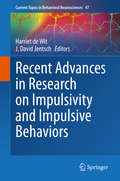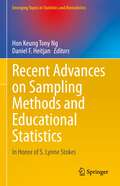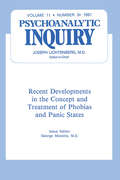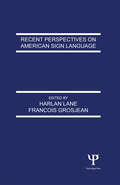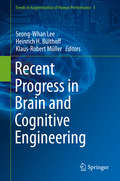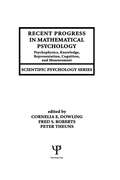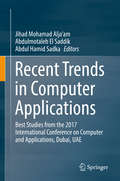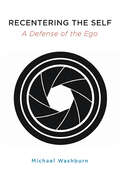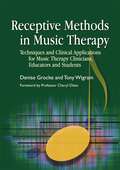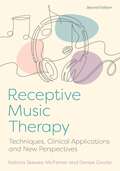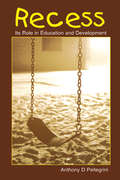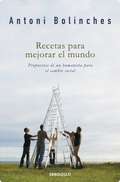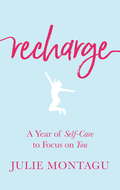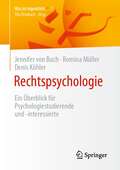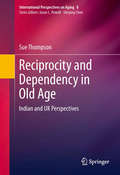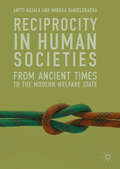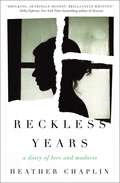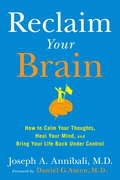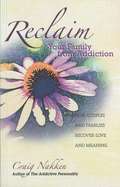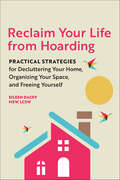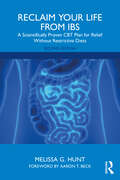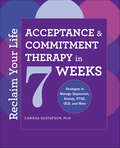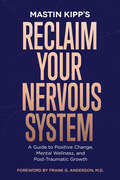- Table View
- List View
Recent Advances in Research on Impulsivity and Impulsive Behaviors (Current Topics in Behavioral Neurosciences #47)
by Harriet De Wit J. David JentschThis volume provides an empirical and conceptual overview of advances in our understanding of impulsivity and impulsive behaviors. Prominent scientists review the range of behavioral phenomena referred to as ‘impulsive’, as well as the defining features and psychological, neurocognitive and behavioral processes that underlie of the manifestation of impulsive behaviors, focussing on progress made and the questions remaining to be answered.
Recent Advances on Sampling Methods and Educational Statistics: In Honor of S. Lynne Stokes (Emerging Topics in Statistics and Biostatistics)
by Hon Keung Tony Ng Daniel F. HeitjanThis edited collection commemorates the career of Dr. S. Lynne Stokes by highlighting recent advances in her areas of research interest, emphasizing practical applications and future directions. It serves as a collective effort of leading statistical scientists who work at the cutting edge in statistical sampling. S. Lynne Stokes is Professor of Statistical Science and Director of the Data Science Institute at Southern Methodist University, and Senior Fellow at the National Institute of Statistical Sciences. She has enjoyed a distinguished research career, making fundamental contributions to a variety of fields in statistical sampling. Reflecting on Professor Stokes' main areas of research, this volume is structured into three main parts:I. ranked-set sampling, judgment post-stratified sampling, and capture-recapture methods II. nonsampling errors in statistical sampling III. educational and behavioral statistics. This collection will be of interest to researchers, advanced students, and professionals in the public and private sectors who would like to learn more about latest advancements in statistical sampling, particularly those who work in educational and behavioral statistics.
Recent Developments: Psychoanalytic Inquiry, 11.3
by George MoraitisFirst published in 1995. Routledge is an imprint of Taylor & Francis, an informa company.
Recent Perspectives on American Sign Language
by Francois Grosjean Harlan L. LanePublished in 1989, Recent Perspectives on American Sign Language is a valuable contribution to the field of Cognitive Psychology.
Recent Progress in Brain and Cognitive Engineering
by Seong-Whan Lee Heinrich H. Bülthoff Klaus-Robert MüllerFor 'Recent Progress in Brain and Cognitive Engineering' Brain and Cognitive Engineering is a converging study field to derive a better understanding of cognitive information processing in the human brain, to develop "human-like" and neuromorphic artificial intelligent systems and to help predict and analyze brain-related diseases. The key concept of Brain and Cognitive Engineering is to understand the Brain, to interface the Brain, and to engineer the Brain. It could help us to understand the structure and the key principles of high-order information processing on how the brain works, to develop interface technologies between a brain and external devices and to develop artificial systems that can ultimately mimic human brain functions. The convergence of behavioral, neuroscience and engineering research could lead us to advance health informatics and personal learning, to enhance virtual reality and healthcare systems, and to "reverse engineer" some brain functions and build cognitive robots. In this book, four different recent research directions are presented: Non-invasive Brain-Computer Interfaces, Cognitive- and Neural-rehabilitation Engineering, Big Data Neurocomputing, Early Diagnosis and Prediction of Neural Diseases. We cover numerous topics ranging from smart vehicles and online EEG analysis, neuroimaging for Brain-Computer Interfaces, memory implantation and rehabilitation, big data computing in cultural aspects and cybernetics to brain disorder detection. Hopefully this will provide a valuable reference for researchers in medicine, biomedical engineering, in industry and academia for their further investigations and be inspiring to those who seek the foundations to improve techniques and understanding of the Brain and Cognitive Engineering research field.
Recent Progress in Mathematical Psychology: Psychophysics, Knowledge Representation, Cognition, and Measurement (Scientific Psychology Series)
by Fred S. Roberts Cornelia E. Dowling Peter TheunsMathematical psychology is an interdisciplinary area of research in which methods of mathematics, operations research, and computer science in psychology are used. Now more than thirty years old, the field has continued to grow rapidly and has taken on a life of its own. This volume summarizes recent progress in mathematical psychology as seen by some of the leading figures in the field as well as some of its leading young researchers. The papers presented in this volume reflect the most important current directions of research in mathematical psychology. They cover topics in measurement, decision and choice, psychophysics and psychometrics, knowledge representation, neural nets and learning models, and cognitive modeling. Some of the major ideas included are new applications of concepts of measurement theory to social phenomena, new directions in the theory of probabilistic choice, surprising results in nonlinear utility theory, applications of boolean methods in the theory of knowledge spaces, applications of neural net ideas to concept learning, developments in the theory of parallel processing models of response time, new results in inhibition theory, and new concepts about paired associate learning.
Recent Trends in Computer Applications: Best Studies from the 2017 International Conference on Computer and Applications, Dubai, UAE
by Abdulmotaleb El Saddik Jihad Mohamad Alja’am Abdul Hamid SadkaThis edited volume presents the best chapters presented during the international conference on computer and applications ICCA’17 which was held in Dubai, United Arab Emirates in September 2017. Selected chapters present new advances in digital information, communications and multimedia. Authors from different countries show and discuss their findings, propose new approaches, compare them with the existing ones and include recommendations. They address all applications of computing including (but not limited to) connected health, information security, assistive technology, edutainment and serious games, education, grid computing, transportation, social computing, natural language processing, knowledge extraction and reasoning, Arabic apps, image and pattern processing, virtual reality, cloud computing, haptics, information security, robotics, networks algorithms, web engineering, big data analytics, ontology, constraints satisfaction, cryptography and steganography, Fuzzy logic, soft computing, neural networks, artificial intelligence, biometry and bio-informatics, embedded systems, computer graphics, algorithms and optimization, Internet of things and smart cities. The book can be used by researchers and practitioners to discover the recent trends in computer applications. It opens a new horizon for research discovery works locally and internationally.
Recentering the Self: A Defense of the Ego (SUNY series in Transpersonal and Humanistic Psychology)
by Michael WashburnIn Recentering the Self, Michael Washburn presents a new account of the ego, ego development, and the role of the ego in spiritual life. He starts by tracing the premodern antecedents of the notion of the ego in Greek philosophy and Christian theology and then explains the seventeenth-century emergence of the notion in Descartes's radically new account of the soul’s relation to the body. Reviewing subsequent criticisms of the notion, the author formulates a revised conception of the ego that highlights the ego's inherently two-sided nature, as a subject and agency that, although rooted within interior consciousness, lives originally and primarily in the material, social world. Washburn uses this revised conception of the ego to explain how the two sides of the ego develop in concert over major stages of the human lifespan and why the ego, despite widespread belief to the contrary, plays primarily a positive role in spiritual life. Recentering the Self makes important contributions to the history of philosophy, consciousness studies, phenomenology, developmental psychology, and spiritual or transpersonal psychology.
Receptive Methods in Music Therapy: Techniques and Clinical Applications for Music Therapy Clinicians, Educators and Students
by Tony Wigram Katrina Mcferran Denise Grocke Emily Shanahan Susan B Wesely Karen Hamlett Matt Holmes Clare Kildea Karin Schou Katerina Stathis Melina RobertsThis practical book describes the specific use of receptive (listening) methods and techniques in music therapy clinical practice and research, including relaxation with music for children and adults, the use of visualisation and imagery, music and collage, song-lyric discussion, vibroacoustic applications, music and movement techniques, and other forms of aesthetic listening to music. The authors explain these receptive methods of intervention using a format that enables practitioners to apply them in practice and make informed choices about music suitable for each of the different techniques. Protocols are described step-by-step, with reference to the necessary environment, conditions, skills and appropriate musical material. Receptive Methods in Music Therapy will prove indispensable to music therapy students, practitioners, educators and researchers.
Receptive Music Therapy, 2nd Edition: Techniques, Clinical Applications and New Perspectives
by Denise Grocke Katrina McFerranThe second edition of Receptive Music Therapy builds on the foundations of the first but provides a completely new rendition, replete with examples from contemporary practices and recognising the value of online music therapy experiences.Learn how music therapists select music from a wide range of diverse musical styles through both collaborative decision making and client-led approaches. Methods include focused music listening, playlist construction, lyric analysis, relaxation, music and imagery along with fundamental principles for receptive music therapy.
Recess: Its Role in Education and Development (Developing Mind Series)
by Anthony D. PellegriniWriting a book about recess could be a very questionable endeavor for a serious academic psychologist. At first blush it seems to be a pretty trivial topic. It's the time during the school day where there's a break from what's typically considered the most serious work of the day--reading, writing, and arithmetic. Reflecting this trivial tenor, it's also that time of the school day that kids--perhaps only half jokingly--say is their favorite part of school. This perception has lead many schools to question the role of recess in the school day. This book is an attempt to broach two views of recess--the perceived value of recess and the movement to eliminate or reduce the school recess period from the primary school day. Due to tightened school budgets and the emphasis on testing, many elementary schools eliminate recess, gym classes, and play periods to the developmental detriment of the very children the schools are supposed to serve. Author Anthony Pellegrini has conducted a number of careful studies regarding student attentiveness and performance within programs that have recess periods, and those that don't. The data show that students need recess in order to blow off energy and interact with each other in the unstructured recess environment in order to grow socially. The goal of Recess is to help readers realize the importance of recess and counter the trend to eliminate it from schools. This book appeals to academics, teachers, administrators, and parents.
Recetas para mejorar el mundo
by Antoni BolinchesMarxismo y capitalismo han fracasado porque no nos han hecho felices. Es hora de descubrir por qué y buscar una alternativa. Se ha demostrado que la filosofía, la economía, la política y las ideologías no son capaces de construir un modelo de sociedad satisfactorio. Demos una oportunidad a la psicología.
Recharge: A Year of Self-Care to Focus on You
by Julie MontaguA month-by-month self-care bible by world-renowned wellness guru Julie Montagu.'The ultimate self-care bible for women who want to find their balance in life' Mel Wells'Wonderful and insightful . . .proves that when you choose YOU every single day, not only will have you have more energy for yourself, but you'll have more energy to give back to everyone else.' Kris Carr'This book is bursting with positivity, happiness & a whole wealth of knowledge' Chessie KingRecently named one of the top ten holistic health icons in the world, Julie Montagu knows a thing or two about health and happiness. In Recharge, Montagu shares an abundance of guidance, tips and advice designed to help you keep self-care at the forefront of your mind and support you on your journey to a well-rounded sense of wellness.Recharge is your month-by-month self-care bible to help replenish your mind, body and soul. Each month of the year covers a specific area of self-care including mindful eating, managing stress, digital detox, rebuilding self-esteem, finding your passions and more.
Recharge: A Year of Self-Care to Focus on You
by Julie MontaguA month-by-month self-care bible by world-renowned wellness guru Julie Montagu.'The ultimate self-care bible for women who want to find their balance in life' Mel Wells'Wonderful and insightful . . .proves that when you choose YOU every single day, not only will have you have more energy for yourself, but you'll have more energy to give back to everyone else.' Kris Carr'This book is bursting with positivity, happiness & a whole wealth of knowledge' Chessie KingRecently named one of the top ten holistic health icons in the world, Julie Montagu knows a thing or two about health and happiness. In Recharge, Montagu shares an abundance of guidance, tips and advice designed to help you keep self-care at the forefront of your mind and support you on your journey to a well-rounded sense of wellness.Recharge is your month-by-month self-care bible to help replenish your mind, body and soul. Each month of the year covers a specific area of self-care including mindful eating, managing stress, digital detox, rebuilding self-esteem, finding your passions and more.
Rechtspsychologie: Ein Überblick für Psychologiestudierende und -interessierte (Was ist eigentlich …?)
by Jennifer von Buch Romina Müller Denis KöhlerDiese Einführung aus der Reihe „Was ist eigentlich …?“ gibt einen kurzen Überblick über das Fach „Rechtspsychologie“. Sie will Psychologiestudierenden am Beginn des Studiums zu einer Orientierung in dieser Teildisziplin verhelfen. Sie bietet aber auch für Fachfremde, die an psychologischen Themen interessiert sind, einen ersten Einblick in die Denkweisen, Modelle und methodischen Herangehensweisen der Rechtspsychologie.
Reciprocity and Dependency in Old Age
by Sue ThompsonThis book highlights (1) the significance of reciprocity for the maintenance of self-esteem in old age and (2) the negative implications for the well-being of dependent older people when that significance goes unrecognized and, as a consequence, opportunities to give back to society, as well as take from it, are not facilitated by those in a position to do so. The discussion draws on research undertaken in the UK and Southern India into the extent to which having the self-perception of being valued in the world is important to older people in receipt of care support and whether, in their experience, this is recognized by others. The author presents an analysis of theoretical insights from leading thinkers across a broad range of literature and from several disciplines, including social theory, social work, philosophy, and gerontology. The author also gives voice to the perspectives of those dependent older people not often heard because of marginalizing and disempowering processes that contribute to their having little opportunity to be heard in the first place. The emphasis of this book is on aspiration to a meaningful life and continuing personal growth as offering a challenge to dominant discourses the equate old age with decline.
Reciprocity in Human Societies: From Ancient Times to the Modern Welfare State
by Antti Kujala Mirkka DanielsbackaPresenting new insights into reciprocity, this book combines Marcel Mauss’s well-known gift theory with Barrington Moore’s idea of mutual obligations linking rulers and the ruled. Teasing out the interrelatedness of these approaches, Reciprocity in Human Societies suggests that evolutionary psychology reveals a human tendency for reciprocity and collaboration, not only in a mutually cooperative way but also through increasing retributive moral emotions. The book discusses various historical societies and the different models of the current welfare state—Nordic (social democratic), conservative, and liberal— and the repercussions of the neoliberal policies of tax havens, tax cuts, and austerity with a cross-disciplinary approach that bridges evolutionary psychology, sociology, and social anthropology with history.
Reckless Ecstasy
by Wanda OwenDECEITFUL GAMBLER The instant flaming-haired Kristina saw dashing Danton Navarro at her mother's high class gaming house, she knew he was the one she'd marry. His virile physique would protect her from all harm; his strong hands would teach her all the secrets of passion. Then the hot tempered girl watched the stranger embrace a voluptuous painted woman and Kristina was filled with an inexplicable rage. She swore that somehow she'd make Danton say "I do." But first she'd flirt with every handsome cardshark and make the man she loved suffer as painfully for her as she did for him. Towering Danton Navarro knew enough willing ladies in El Paso who would freely pleasure him all night long, but some despeerately needed information led him to the Crystal Castle. There he found the most fetching, provocative miss he had ever desired and was furious that she bartered the exquisite body only he had the right to possess. He never stopped to think she might not be what she seemed. All that governed him now was the overwhelming need to crush the pouting lips, brand the silken thighs, and force her supple body to totally submit to his driving Reckless Ecstasy.
Reckless Years: A Diary of Love and Madness
by Heather ChaplinIn this page-turning memoir, a woman tries to reinvent her life after divorce and discovers that sometimes finding yourself is not all it’s cracked up to be.Trapped in a dissatisfying marriage for nearly a decade, New York journalist Heather Chaplin finally summons the courage to leave. On her own, she finds herself intoxicatingly free, pursuing adventure, and juggling romance on two continents in multiple cities. She contemplates the meaning of life; she falls for a handsome Irishman. But as the adventures progress, Chaplin’s own reckless choices send her spiraling downward—and toward a reckoning she’s avoided all her life. Pulled from Chaplin’s own diaries, Reckless Years is a raw, propulsive debut: unfailingly profound and impossible to put down.
Reclaim Your Brain
by Daniel G. Amen Joseph A. AnnibaliA prescriptive guide to restoring cognitive calm, based on Amen Clinic Chief Psychiatrist Dr. Joseph Annibali's three decades of treating patients who suffer from overloaded, over-stimulated brains. Dr. Joseph Annibali has treated thousands of people with overloaded, over-stimulated brains. Some people describe their brain as being "in chaos"; others feel that their brain is "on fire." But whether they are ultimately diagnosed with "normal" anxiety, disabling OCD, depression, bipolar disorder, or even substance abuse, the underlying problem is a Too-Busy-Brain, a great irritant that interferes with attention, concentration, focus, mood, and often much more. It may even be a sign of undetected damage to either the brain or the body itself. But through practical strategies, understandable explanations, and prescriptive mind-management techniques, Dr. Annibali will help readers finally reclaim their brains and get back in control of their lives.From the Hardcover edition.
Reclaim Your Family From Addiction: How Couples and Families Recover Love and Meaning
by Craig NakkenWith histories, personal stories, and the latest research, this book helps readers chart their way out of addiction and back to the fullness of family by using principles that restore the "we" of lasting, loving relationships.What happens to the "we" of a family when one member opts for the blind and single-minded "me" of addiction? In an instructive, reassuring way, Craig Nakken explains just how families and couples who have spent years building a life together can lose their cohesive identity and meaning in the wake of addiction. The perfect starting point in the healing process, this book Reclaim Your Family From Addiction-also reminds us that recovery is possible--for individuals, couples, and whole families--if only we know what to do. With histories, personal stories, and the latest research, the book helps readers chart their own way out of the hell of addiction and back to the fullness of family by using principles that restore the "we" of lasting, loving relationships. Craig Nakken, M.S.W., author of The Addictive Personality and Men's Issues in Recovery, lectures, trains, and specializes as a family therapist in the treatment of addiction. He lives in Minneapolis, Minnesota.
Reclaim Your Life From Hoarding: Practical Strategies for Decluttering Your Home, Organizing Your Space, and Freeing Yourself
by Eileen DaceyDeclutter your life, create space, and find peace with your belongingsOur possessions can be a fun window into the past, who we are, and what we hold dear—but sometimes all that stuff can get in the way of everyday life. If you identify as a clutterbug or are feeling a little overwhelmed with all your stuff, the straightforward guidance in this book will help you get organized and feel more in control of your home—and your life.This easy-to-follow hoarding workbook gives you strategies for decluttering, prioritizing your goals, and building a support team before walking you through the process room by room. With advice on both how to sort through your items and change the way you acquire things, you'll gain the confidence you need to succeed.Inside this standout among hoarding books you'll find:Real talk—Read stories about how other people who struggle with clutter have found ways to cope and reduce their belongings.Self-care strategies—Each chapter has a tip to help you focus on taking care of yourself with thoughtful, stress-relieving suggestions.Action plan—Simple but productive exercises will help you make lasting changes through manageable steps and everyday actions.Take control of the possessions in your life with this book's gentle guidance.
Reclaim Your Life from IBS: A Scientifically Proven CBT Plan for Relief Without Restrictive Diets
by Melissa G. HuntReclaim Your Life from IBS teaches a number of skills that can directly reduce the impact of gastrointestinal symptoms in a person’s life. The book explores the differential diagnosis of irritable bowel syndrome (IBS) and the current scientific models of what causes IBS. It teaches the reader the cognitive model of stress management using cognitive-behavioral therapy and helps readers learn to identify their negative beliefs and reframe them more accurately. It also guides readers to reduce avoidance and helps them understand how to use dietary modifications and medications wisely, rather than reactively. In this second edition, numerous case examples throughout illustrate the application of these core CBT skills to IBS-related thoughts and experiences, and new material is included on exercise, diet, and medications. This book is a proven self-help book for people with IBS, as well as being useful as a treatment manual for clinicians who work with patients with IBS.
Reclaim Your Life: Strategies to Manage Depression, Anxiety, PTSD, OCD, and More
by Carissa GustafsonAccept your thoughts, start living your life with Acceptance and Commitment TherapyThoughts are simply a normal part of being human, but we've all had them disrupt our lives. Reclaim Your Life teaches you to accept and manage your thoughts with evidence-based principles and strategies from Acceptance and Commitment Therapy. Discover ways to increase your flexibility in thinking, get some distance from your thoughts, and work toward a life full of values and purpose.Acceptance and Commitment Therapy helps you get a handle on your emotions and find more adaptive responses from difficulties like panic attacks and low self-esteem. When strategies like labeling, visualizing, chatting with your mind, and others are implemented, they bring a positive change in your life.This book about Acceptance and Commitment Therapy includes:The program—Apply the six core processes to each week and then bring them all together during the seventh and final week.Broad array of issues—Acceptance and Commitment Therapy can help with mental health issues like obsessive compulsive disorder (OCD), depression, anxiety, and post-traumatic stress disorder (PTSD).Hands-on—Use the six chapter lessons, worksheets, and exercises to learn each step of the process.Reclaim Your Life is everything an Acceptance and Commitment Therapy book should be. It allows you to live the good life you deserve.
Reclaim Your Nervous System: A Guide to Positive Change, Mental Wellness, and Post-Traumatic Growth
by Mastin KippAn empowering guide to healing from trauma by understanding what it is and how it affects our nervous system, featuring tools and techniques and a personalized recovery plan.In this book, Mastin Kipp guides readers through a personalized plan for working through trauma. Readers will learn what trauma is and what it isn't, how trauma denial is fueling so many problems, the basics of his highly effective Functional Life CoachingTM model, the healing power of attachment theory, the neuroscience and nervous system behind this protocol, and a vision for a trauma-informed world.Kipp explains why trauma is so misunderstood by the world right now. He also shares compelling personal stories and client stories to demonstrate how various tools and techniques effectively heal trauma. Methods include attachment theory, Poly Vagal theory, internal family systems, functional medicine, and the author's signature process, Functional Life CoachingTM. Through healing your trauma, you'll jump-start manifesting, goal setting, and biohacking.Readers will come away with a clear understanding of trauma in their own lives and others', and how to apply the best practices and information to fully heal and thrive.Foreword by Dr. Helen Messier, Ph.D., M.D.
